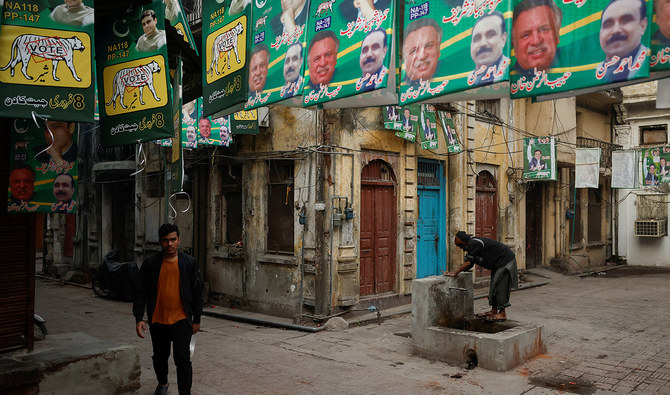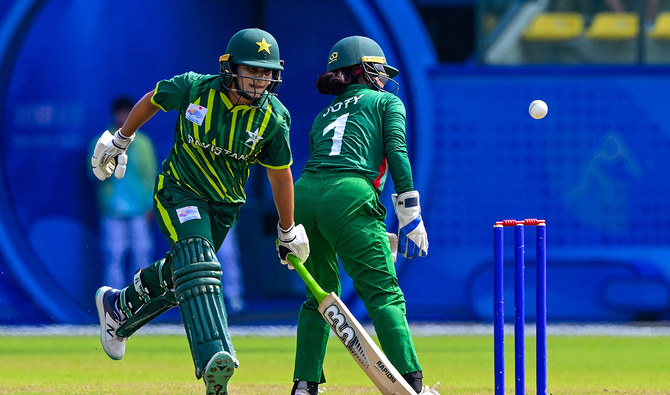ISLAMABAD: Pakistan’s 127 million voters get to elect a new parliament on Thursday. The elections are the twelfth in the country’s 76-year history, which has been marred by economic crises, military takeovers and martial law, militancy, political upheavals and wars with India.
Forty-four political parties are vying for a share of the 266 seats that are up for grabs in the National Assembly, or the lower house of parliament, with an additional 70 seats reserved for women and minorities.
After the election, the new parliament chooses a prime minister. If no party wins an outright majority, then the one with the biggest share of assembly seats can form a coalition government.
WHO IS IN THE RACE?
Pakistani politics are dominated by men and three parties: the Pakistan Muslim League-Nawaz (PML-N), the Pakistan Tehreek-e-Insaf (PTI) and the Pakistan People’s Party (PPP).
The top contender is PML-N and on its ballot are two former prime ministers, Nawaz Sharif and his younger brother Shehbaz Sharif.
Their ally the PPP, led by Bilawal Bhutto-Zardari, a member of a political dynasty, has a power base in the country’s south. Though it’s unlikely to get enough votes to get him the premiership, he could still be part of a Sharif-led coalition government.
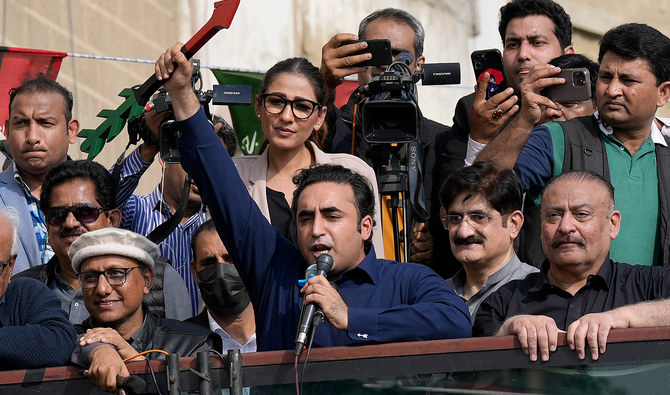
Bilawal Bhutto Zardari, center, Chairman of Pakistan People's Party, raises his party's election symbol as he addresses to his supporters during an election campaign rally, in Karachi on February 5, 2024. (AP)
However, it is the absence from the ballot of PTI’s founder, cricket legend turned politician Imran Khan, that’s at the forefront of public discourse in Pakistan.
Though it’s become the norm for corruption allegations and court cases to dog prime ministers — many of Pakistan’s leaders have been arrested, disqualified or ousted from office — the intensity of the legal action against Khan is unprecedented.
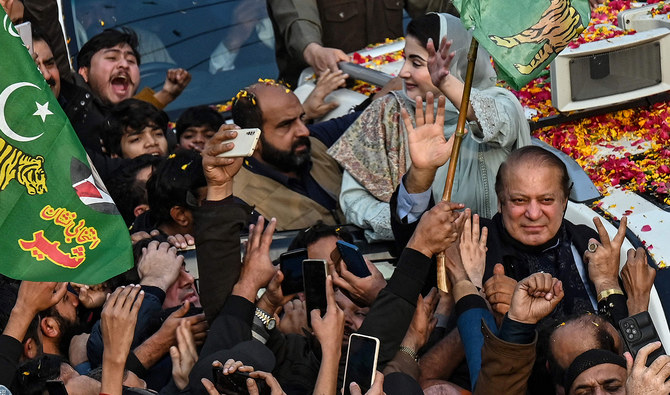
Pakistan's former Prime Minister and leader of the Pakistan Muslim League (PML) party Nawaz Sharif (R) and his daughter Maryam Nawaz (top) wave to supporters during an election campaign rally in Lahore on January 23, 2024. (AFP)
Khan is in prison and with four criminal convictions so far, three of them handed down last week, he is barred from running in elections or holding public office. He’s been sentenced to three, 10, 14 and seven years, to be served concurrently, and has more than 150 other legal cases pending against him.
His party says it’s not getting a fair chance to campaign.
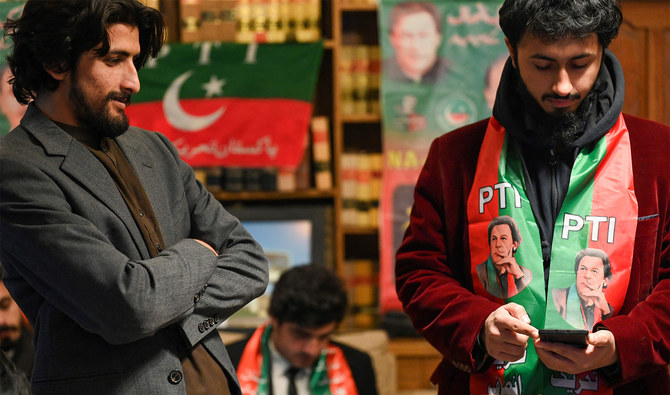
Pakistan's former prime minister Imran Khan's supporters wear scarves with prints of his Pakistan Tehreek-e-Insaf (PTI) party as they listen to a virtual election campaign on phones at Khan's PTI office in Islamabad on February 3, 2024. (AFP)
Smaller, religious political parties that appeal to a section of the conservative Muslim country have no chance of getting a majority but could still be part of a coalition government. The Pakistani military is not on the ballot but is the real power behind the scenes — it has ruled the nation for half of its history and calls the shots in most government decisions.
WHAT ARE THE MAIN ISSUES?
The next government will have a long to-do list: fixing the economy, improving relations with the neighboring, Taliban-run Afghanistan, repairing crumbling infrastructure and resolving year-round power outages. Last but not least is containing religious and separatist militant groups.
Pakistan has been relying on bailouts to prop up its foreign exchange reserves and avoid default, with the International Monetary Fund and wealthy allies like China and Saudi Arabia financing the country to the tune of billions of dollars. The IMF, which last July approved a much-awaited $3 billion bailout, has warned of sustained high inflation this year, around 24 percent, and a rise in poverty levels.
Like many others, Pakistanis grapple with a soaring cost of living. They endure gas outages overnight and hours-long electricity blackouts — no government has so far been able to resolve the power crisis.
Ties with Afghanistan and its Taliban rulers nosedived after Pakistan began arresting and deporting foreigners living in the country illegally, including around 1.7 million Afghans. The two neighbors regularly blame each other for cross-border militant attacks and skirmishes often close key crossings.
Pakistan was devastated by floods in the summer of 2022 that killed 1,700 people, at one point submerging a third of the country and causing billions of dollars in damage. According to the UK-based Islamic Relief charity, only an estimated 5 percent of damaged and destroyed homes have been fully rebuilt.
The Pakistani Taliban, or Tehreek-e-Taliban Pakistan, are again waging war to overthrow the government and impose an Islamic caliphate. In the southwest, the Baloch separatists want independence and a greater share of resources.
WHAT’S THE MOOD LIKE?
Most Pakistanis are fed up after years of political infighting and no improvements in their living standards. People on the street are quick to tell you they don’t believe things will be different after this election.
Khan’s disqualification from running has infuriated his supporters, who have pledged to show their loyalty at the ballot box. But the intense legal and security crackdown on Khan and his followers may have worn them down.
Also, there is no guarantee that PTI voters will turn out in sufficient numbers to give the party a win — or that their votes will be fairly counted. The Foreign Ministry says there will be 92 international election observers, including from the European Union and foreign embassies.
Another factor shaping public sentiment is the return last October of former Prime Minister Nawaz Sharif, who came back to Pakistan after four years in self-imposed exile abroad to avoid serving prison sentences at home.
Within weeks of his return, his convictions were overturned, leaving him free to seek a fourth term in office. Despite the years of controversies, he enjoys immense popularity and seems to have a pretty straight path to the premiership.
The sharp contrast in the treatment of the two front-runners — Sharif, with his speedy and smooth comeback, and Khan, with his seemingly insurmountable legal hurdles — have led many to believe Sharif’s win is all but certain.
Rights groups say the election is unlikely to be free or fair. Experts have warned that all the political shenanigans underway since Khan’s 2022 ouster have fueled anti-establishment sentiment.
That in turn has fed a growing apathy among voters and threatens a low turnout, which would further undermine the credibility of the election. Amid the discontent and divisions, getting a strong coalition to agree on and work for meaningful changes in Pakistan will be difficult.



